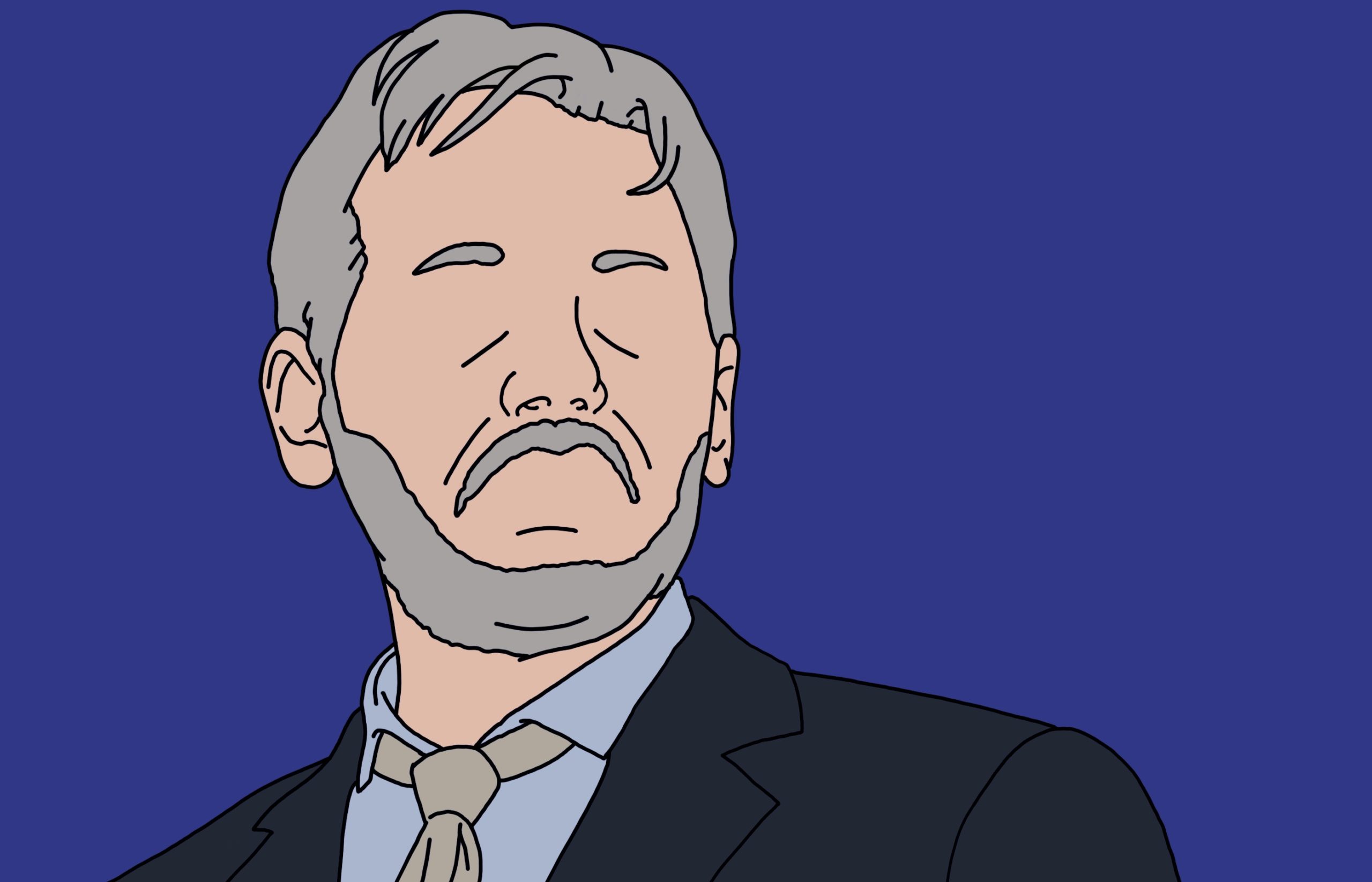How the trial of WikiLeaks founder, Julian Assange, could threaten free speech for years to come.
Illustration by staff illustrator Sakura Siegel.
As the United States presidential election comes closer, there are growing concerns on how the largely unaddressed coronavirus will disrupt the regular structures in place for Americans to vote and whether or not American democracy is witnessing its final days.
The president’s actions and rhetoric surrounding the election are raising additional alarms. This year, Donald Trump has deliberately attempted to sabotage mail-in voting, purged voter rolls in key states and refused multiple requests to guarantee a peaceful transition if he loses in November.
However, the president’s greatest attack on what remains an incredibly flawed American democracy has been largely under-reported, despite it being a regular part of global affairs this past September. This attack is the trial of Australian journalist and WikiLeaks founder, Julian Assange.
The trial, which began on Sept. 7 and wrapped witness testimony on Oct. 1, should concern every single person who values press freedom around the world. More than just another case of the Trump administration’s war on journalists, the Assange trial is a direct attack on the first amendment and could set an irreparable precedent for the rights of journalists around the world.
How it all began
But to understand why the Assange trial poses such a threat, one must understand the charges.
Assange is on trial for WikiLeaks’ key role in exposing war crimes that the United States military committed in Iraq and Afghanistan.
These crimes were first revealed in early 2010 when the U.S. Army intelligence analyst, Chelsea Manning, leaked a cache of classified government files. The files were published by WikiLeaks in partnership with several more traditional news outlets.
Of the many human rights violations the leaked files revealed, the well-known one is from the infamous “Collateral Murder Video” where U.S. forces can be heard laughing as they fire on a group of civilians including a Reuters journalist and his translator.
Ever since the files were published, Assange has been the subject of smear campaigns, which have successfully discredited him as a serious journalist in the eyes of the mainstream journalism community.
The lack of solidarity with Assange resulted in a desperate attempt on his part to avoid being extradited to the United States in June 2012. At the time, the Swedish government wanted to question Assange for part of a preliminary investigation into whether or not he could be charged with sexual assault.
The facts of this investigation have been largely misreported by much of the international press due to the complicated and unique nature of Swedish law and a likely well-intentioned desire by journalists to give sexual assault victims the recognition they deserve.
However, many human rights advocates — including Nils Melzner of the United Nations and Katrin Axelsson and Lisa Longstaff of Women Against Rape — have since voiced that the investigation was part of a calculated attempt to extradite Assange to the United States for his role in publishing Manning’s leaks.
After the Swedish government refused to promise Assange that he would not be extradited to the U.S. if he returned to Sweden to comply with the investigation, the WikiLeaks founder entered the Ecuadorian Embassy in London, where then-president of Ecuador, Rafael Correa, was willing to provide him asylum.
Assange would remain in the embassy for almost seven years, from his initial entrance on June 19, 2012 to April 11, 2019, when his asylum was revoked and he was arrested by London Metropolitan Police.
The danger of extradition
Assange was arrested by the Ecuadorian Embassy for skipping UK bail to avoid being sent to Sweden, which has since been dropped. But this isn’t the reason why he’s on trial.
Assange is wanted by the United States under 17 charges of violating the Espionage Act, a highly controversial bill, which has historically been used by the United States government to silence dissenting voices in times of war.
Even before the trial began, there was good reason to be concerned about the impact an extradition could have on press freedom.
Assange is not a citizen of the country calling on him to be extradited or the country that will decide if he is extradited. Even if Assange were to be found innocent in the United States, the act of extradition alone would set the precedent.
It would mean that anyone — American citizen or not — can be forced to stand trial in the United States for publishing truthful information.
What the trial revealed
Witness testimony ended on Oct. 1, after four heated weeks in which Assange’s legal team largely eviscerated the prosecution.
Following the end of witness testimony, Judge Vanessa Baraitser, who has been overseeing the trial, announced that her verdict will come on Jan. 4, 2021. Until then, there will likely be somewhat of a lull in news surrounding the case, but the past four weeks have come with plenty to unpack, much of which makes it more obvious that this is the big threat to press freedom that leading human rights groups including Human Rights Watch, Amnesty International, and the ACLU are claiming it to be.
The most concerning moment came on the tenth day of hearings where the prosecution changed their approach.
The initial line they used was that they could extradite Assange to the United States because he is not a real journalist and thus doesn’t deserve the same protections journalists would receive under the First Amendment.
However the tune changed, after several expert witnesses brought in by the defense demonstrated clearly that Assange’s publishing through WikiLeaks meets all the same journalistic standards of more traditional outlets like The New York Times or The Washington Post.
The prosecution’s response to this legal defeat was to outright claim that they can try Assange under the Espionage Act because, actually, the First Amendment doesn’t necessarily guarantee free speech protections to journalists. This is explained in human rights activist and former British diplomat, Craig Murray’s reporting on the trial.
“The approach has now changed and on Tuesday a radically more aggressive approach was adopted by the prosecution asserting the right to prosecute all journalists and all media who publish classified information under the Espionage Act (1917).”
You should be worried
For journalists, international law experts, human rights activists, and general news junkies, the Assange trial is incredibly fascinating for any number of reasons.
But the average person should also be paying close attention because, as distant as it may be now, the trial will have long-term implications for all who value free speech if Judge Baraitser rules in favor of extradition.
As stated before, an extradition alone would deter many in the international journalism community from exposing information that could make the United States government look bad out of fear that they could face the same consequences Assange has.
Countries subject to the often illegal and gruesome whims of the U.S. State Department deserve to have their stories told, and they will not be told if the bravest reporters are subjected to the same smear campaigns, legal attacks and psychological torture Assange has been subjected to.
While foreign policy is the most obvious form of reporting to be restricted as a result of extradition, there is no reason the scope of U.S. silencing of journalists would end at those who cover wars.
Environmental harm, police corruption and violence, mass surveillance of citizens, and economic meddling on behalf of big businesses are all areas in which the United States government has been exposed by journalists.
The charges being applied to Assange can just as easily be applied to any journalist who does their job well. It would quite literally be a death blow to press freedom and all dissenting voices who are empowered by the role journalists play in questioning the powerful.
Donald Trump’s violence towards protesters and opposition to democratic processes are a threat to democracy, but nothing done by his administration carries the long-term implications that the Assange trial does.
Rather than focusing too much on the result of the election in November, Americans wishing to oppose fascism should keep their eyes to the United Kingdom and speak out against an extradition of Julian Assange and the attack on the First Amendment that it poses.


